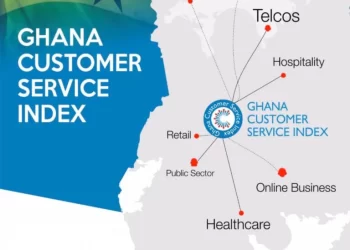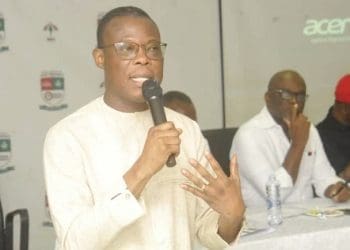Togo’s President of the Executive Council, Faure Gnassingbé, has asked African leaders not to think of peace as an abstract or idealistic aspiration, but as a strategic project because the world is living in a time of great upheavals.
Addressing the opening session of the second edition of the Lome Peace and Security Forum (LPSF) in the Togolese capital, President Faure Gnassingbé cautioned that, “geopolitical rivalries are flaring up again, conflicts are multiplying, and threats are evolving. Everywhere, the multilateral mechanisms that once underpinned much of international security are weakening.”
First held in 2023, the LPSF is a platform for African leaders, policymakers, and scholars to engage in strategies for sustaining peace, enhancing regional cooperation, and responding to evolving security challenges in Africa.
President Gnassingbe said African must be the main actors of the continent’s security, adding that, “too often, our continent has been treated as a stage for external rivalries. Our problems have been analysed from foreign capitals, and solutions have been decided and imposed from other venues. But the world is changing — and that model is outdated.”
He said the strategy for Africans to decide on Africa’s peace architecture is not a desire for isolation, but rather an attempt “to firmly exercise our ability to define our own priorities, instruments, and alliances.”
“Lasting peace is built through local cohesion because peace cannot be decreed — it must be built. And it is built through inclusion and social justice. Many of the conflicts we face often stem from territorial inequalities, social frustrations, or political exclusion,” President Faure Gnassingbé added.
He said, “when a community feels forgotten, marginalized, or scorned, instability is never far behind. A lasting response lies in strengthening local bonds — in citizen participation, community dialogue, and national reconciliation.”
In addition, President Gnassingbe said it must be recognised that, women, youth, local authorities, and civil society are all full-fledged actors in peacebuilding, adding that, “peace is not just the absence of war, but the presence of justice, dignity, and hope. It is through representative institutions and fair access to public services that stability is forged.”
He said a large part of this battle will take place in the digital realm. Technology could be a powerful tool for prevention and mediation — but it also poses risks.
President Faure Gnassingbé mentioned disinformation in the digital space, the hostile use of drones, and the rise of new inequalities due to the digital divide as some of the challenges, adding that, “our states must not only be users and promoters of these technologies, but also guardians, ensuring they serve peace, not destabilization.”
Liberia’s President Joseph Boakai said, “Liberia stands today as a living proof that peace is possible when a nation chooses dialogue over division and forgiveness over vengeance,” adding that, “our experience shows that the road to peace begins with justice, inclusion, and local ownership.”
He said “accountability strengthens peace, not weakens it. We must end national amnesia and ensure that future generations remember the cost of violence and the value of peace.”
Angola’s minister for foreign affairs, Tete Antonio said, the threats to peace and stability on the continent remain multiple and interconnected.
“Armed conflicts, terrorism and violent extremism, transnational crime, governance challenges, climate change and food insecurity, ethnic or religious rivalries, as well as dissatisfaction with social and economic difficulties combined with limited employment prospects, are among the factors driving youth to sometimes turn to armed and extremist groups.”
Antonio said this vulnerability, combined with insufficient state presence in some regions, also facilitates the illegal exploitation and mismanagement of natural resources, perpetuating vicious cycles of poverty and instability in certain conditions.
He said Angola is committed to promoting political dialogue, reconciliation, and cross-border cooperation while supporting regional efforts for stabilization, development, and integration. adding that, sustainable peace necessarily involves economic and social development, and “no security strategy can thrive if the population continues to live in poverty or precariousness.”
Antonio said the transformation of the African agricultural sector is very important and Africa, with over 60 per cent of the world’s arable land, favourable natural conditions and abundance of water, must urgently develop its agricultural system to feed its population, ensure food security, renovate rural development, create jobs for the youth and women, and achieve food self-sufficiency.
He said , the root causes of African conflicts, are inequality, marginalization, and certain difficulties in governance and food security, and said attempts must be made to must strengthen initiatives to promote good governance, transparency, and social justice while investing massively, especially in youth education, training, and entrepreneurship.
Antonio said the youth, who represent more than half of Africa’s population, must be seen as strategic actors for lasting peace and not as passive spectators.
Togo’s minister of foreign affairs, Robert Dussey, said his country is serving as a major diplomatic crossroads in the service of peace in Africa, stating this is commitment that, “we as a people, in a regrettable context of resurgence, will embrace with a desire to carry the message of the ideal,” adding that, “peace remains essential, indeed indispensable.”
He said Togo is working for peace with the conviction that “dialogue remains the surest path to stability. This conviction inspires this approach, that of thinking together, acting together, and building peace together, in a spirit of shared responsibility and strengthened cooperation.”












